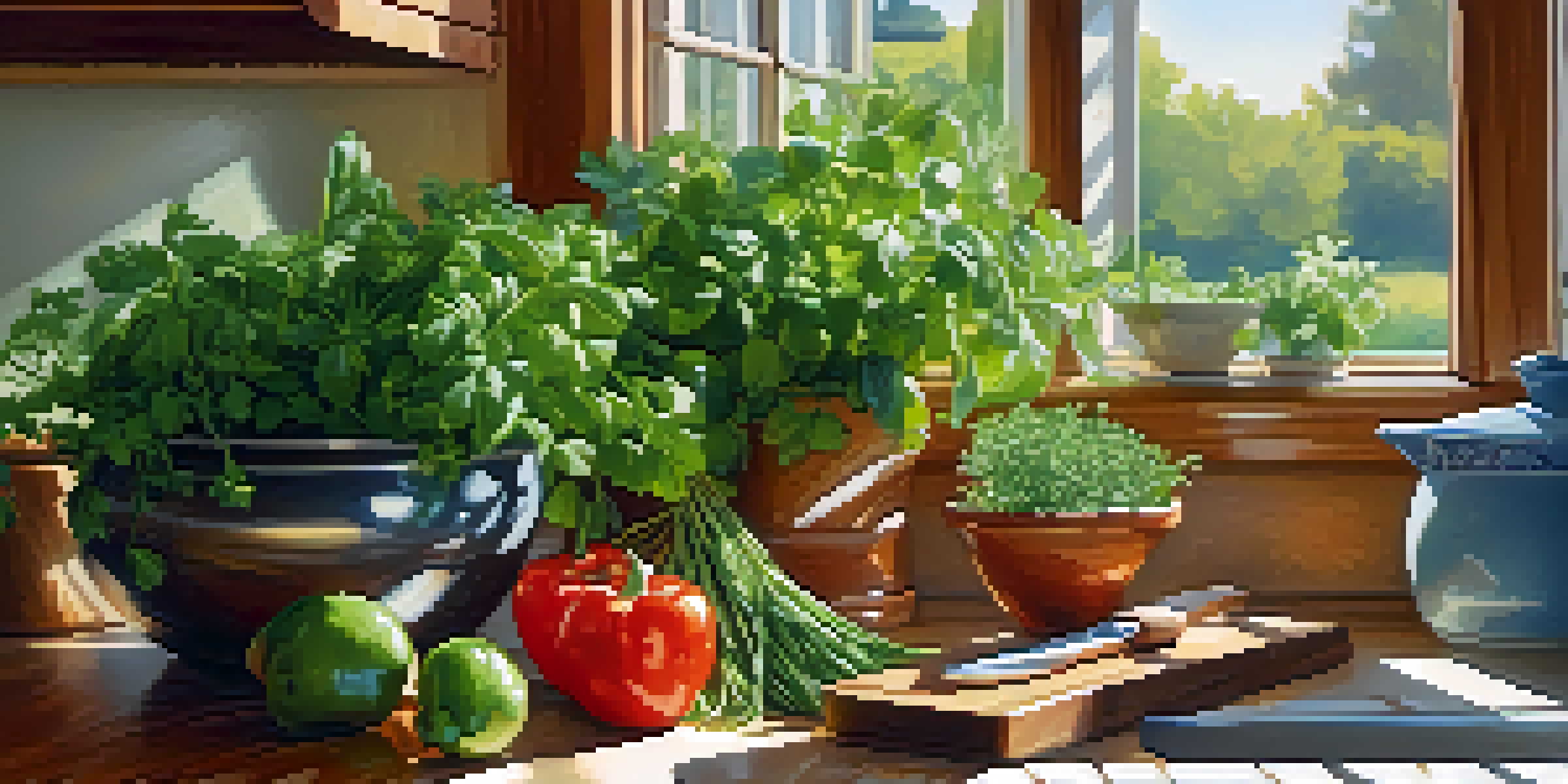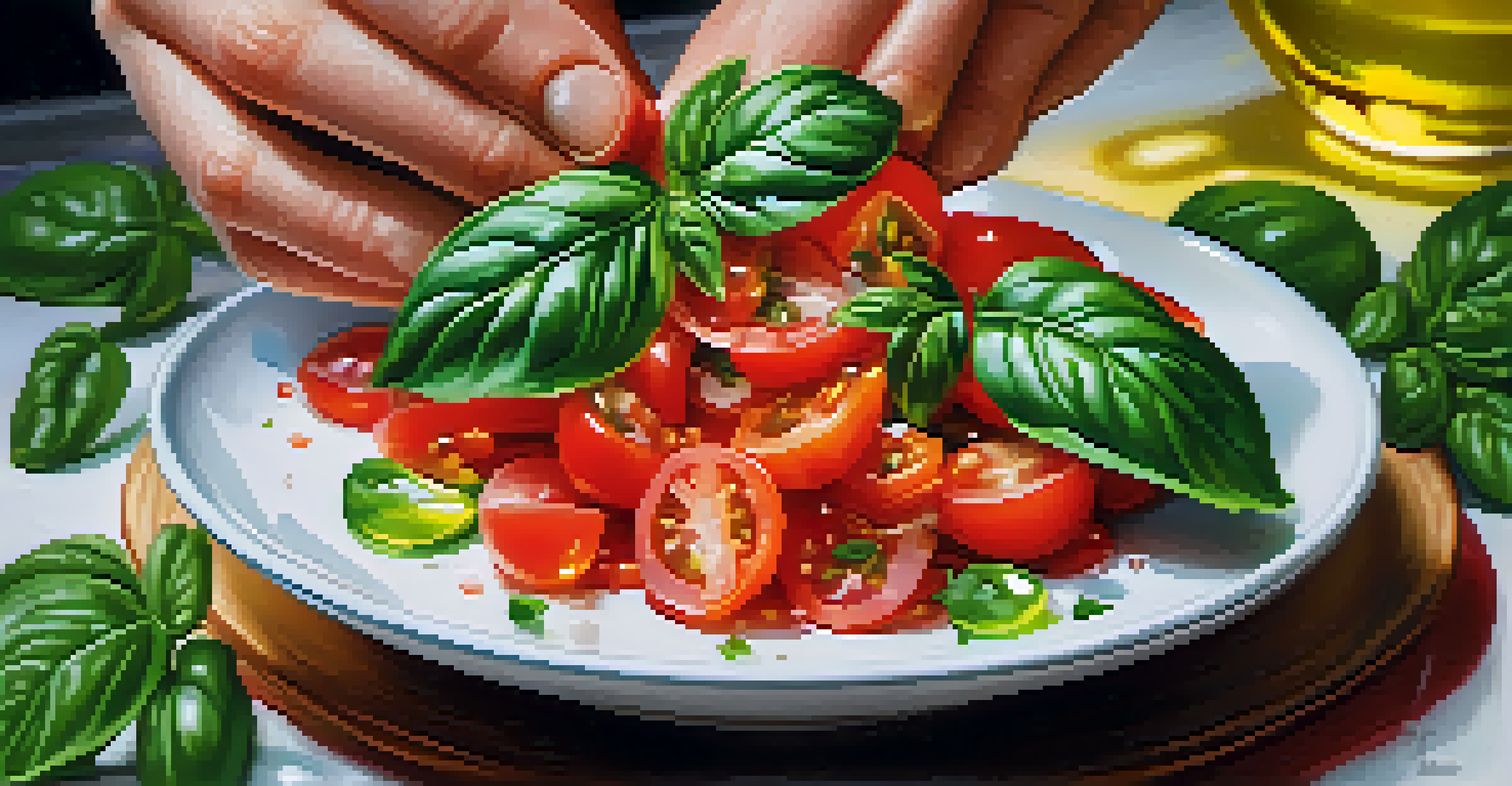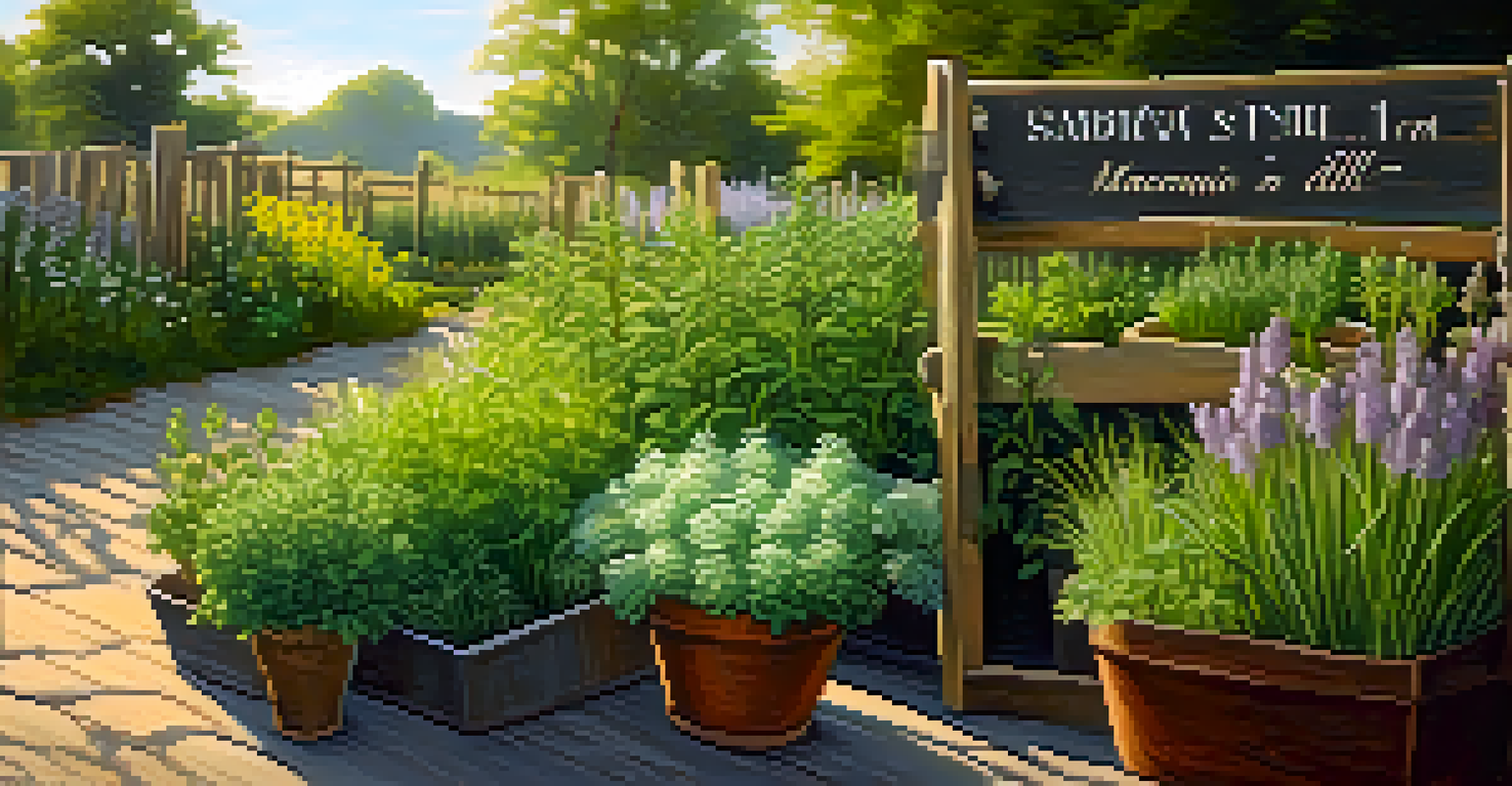Vegan Cooking with Herbs: Infusing Flavor into Dishes

Why Herbs Are Essential in Vegan Cooking
Herbs are the unsung heroes of vegan cooking, adding layers of flavor that can elevate even the simplest dishes. Unlike spices, which add heat or warmth, herbs bring freshness and brightness, making them essential for plant-based meals. With a variety of herbs available, from basil to thyme, each has a unique profile that can transform your cooking.
Herbs are the spice of life.
In vegan cuisine, where the focus is often on vegetables and grains, herbs serve as flavor enhancers that can make your meals more exciting. For example, a sprinkle of fresh parsley can brighten a hearty lentil stew, while cilantro can give a vibrant twist to black bean tacos. Using herbs not only enhances taste but also adds nutritional benefits, as many herbs are rich in vitamins and antioxidants.
Incorporating herbs into your dishes can also be a creative outlet. Experimenting with different combinations can lead to delightful surprises in flavor and aroma. So, whether you’re whipping up a quick salad or a complex dish, don’t forget to reach for your herb garden or the spice rack!
Popular Herbs to Use in Vegan Dishes
Some of the most popular herbs for vegan cooking include basil, cilantro, dill, and rosemary. Basil, with its sweet and slightly peppery flavor, is perfect for pesto or as a fresh topping on tomato-based dishes. Cilantro, on the other hand, adds a refreshing zing to salsas and curries, making it a favorite in many cuisines.

Dill is another versatile herb that pairs wonderfully with vegan yogurt-based dressings and potato salads. Its unique flavor can bring a lightness to heavier dishes. Meanwhile, rosemary, with its woodsy aroma, is great for roasted vegetables or as a seasoning for hearty grains like quinoa or farro.
Herbs Add Flavor to Vegan Meals
Herbs are essential in vegan cooking as they enhance flavor and provide nutritional benefits, transforming simple dishes into exciting meals.
These are just a few examples of the many herbs that can transform your vegan cooking. Each herb has its own distinct flavor profile and can be paired in various ways to enhance your meals. So, don’t hesitate to explore the herb aisle at your local market!
How to Properly Prepare Fresh Herbs
To get the most flavor out of fresh herbs, proper preparation is key. Start by washing them gently under cold water to remove any dirt or impurities. Pat them dry with a clean kitchen towel or use a salad spinner to avoid excess moisture, which can dilute their flavor when added to dishes.
Cooking is like love. It should be entered into with abandon or not at all.
Next, consider how to chop or tear them. For delicate herbs like basil and parsley, tearing them by hand can release essential oils and enhance their aroma. For sturdier herbs like rosemary, using a sharp knife to chop them finely will help distribute their flavor more evenly throughout your dish.
It’s also important to know when to add herbs during the cooking process. Some herbs, like thyme and rosemary, can withstand longer cooking times, while fresh basil and cilantro are best added at the end to preserve their vibrant flavors. This simple tip can make a world of difference in your vegan dishes!
Growing Your Own Herbs at Home
Growing your own herbs is a rewarding way to enhance your vegan cooking. Not only does it ensure you have fresh herbs on hand, but it also allows you to experiment with different varieties. Even if you have limited space, many herbs can thrive in small pots on a windowsill or balcony.
Start with easy-to-grow herbs like basil, mint, or chives. These herbs require minimal care and can flourish with just a little sunlight and water. Plus, there’s nothing quite like the satisfaction of snipping fresh herbs from your garden to add to your meals.
Growing Herbs is Rewarding
Cultivating your own herbs not only ensures freshness but also allows for culinary experimentation, enhancing the overall cooking experience.
As you gain confidence, consider expanding your herb garden to include more exotic varieties like Thai basil or lemon balm. Growing your own herbs not only enhances the flavor of your dishes but also adds a personal touch to your cooking experience.
Creative Ways to Use Herbs in Cooking
Incorporating herbs into your dishes can go beyond simply sprinkling them on top. Consider making herb-infused oils or vinegars for a flavorful addition to salads and marinades. By gently heating oil with herbs, you can create a fragrant base for dressings or drizzling over roasted vegetables.
Another creative approach is to blend herbs into dips and spreads. For instance, making a herbaceous hummus by adding fresh parsley or cilantro can elevate this classic dish and make it more exciting. You could also create a zesty herb pesto using various nuts and greens for a nutritious boost.
Don’t forget about beverages, either! Fresh herbs can add a refreshing twist to drinks, such as mint in lemonade or basil in a fruit smoothie. These little touches can make your meals and drinks feel gourmet without the need for complicated recipes.
Pairing Herbs with Seasonal Ingredients
Pairing herbs with seasonal ingredients is a fantastic way to enhance both flavor and nutrition in your vegan meals. For example, in the summer, fresh basil pairs perfectly with juicy tomatoes and cucumbers, creating a refreshing salad. In the fall, rosemary can complement root vegetables like carrots and sweet potatoes superbly.
By aligning your herbs with what’s in season, you’ll not only achieve better flavor but also support local farmers and reduce your carbon footprint. Seasonal produce is often fresher and more flavorful, making it the perfect match for your favorite herbs.
Proper Use of Herbs Matters
Understanding when and how to use herbs can significantly elevate your dishes, preventing common mistakes and ensuring balanced flavors.
Moreover, this approach encourages creativity in the kitchen. You may discover unexpected combinations that become new favorites, such as sage with pumpkin or mint with peas. Embracing seasonal cooking invites a sense of adventure into your vegan culinary journey.
Common Mistakes to Avoid When Using Herbs
Even the best cooks can make mistakes when it comes to using herbs. One common error is adding dried herbs at the wrong time. Dried herbs are more concentrated than fresh, so they should generally be added earlier in the cooking process to allow their flavors to develop, while fresh herbs are best added towards the end.
Another mistake is storing herbs improperly. Many people keep fresh herbs in the fridge, which can cause them to wilt quickly. Instead, try treating them like flowers by placing them in a glass of water and covering them loosely with a plastic bag to extend their freshness.

Lastly, don’t underestimate the power of balancing flavors. Using too many herbs can overwhelm a dish, while using too few can leave it flat. Finding the right balance takes practice, but it’s essential for creating delicious, herb-infused meals.